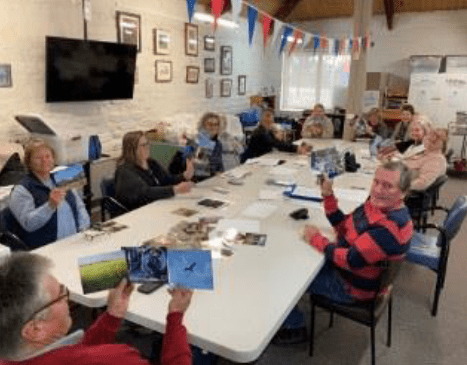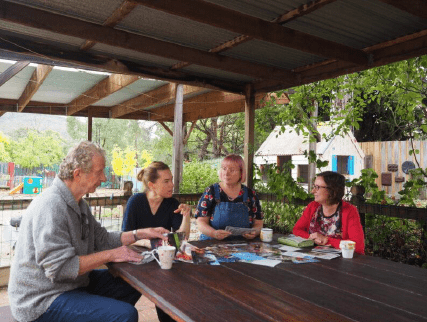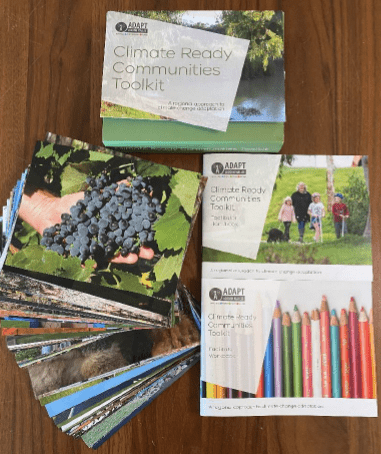Get Your Community Climate Ready!
We want to support communities in the region to build resilience, be ready to face the challenges and embrace the opportunities of a changing climate.
Local conversations are very important when it comes to addressing climate change. Whether you talk to your friends, colleagues and family members for information-sharing, advice-giving or just to express your concerns, talking things through can help put things into perspective which helps build relationships and resilience.
Conversations can lead communities to gaining a greater understanding and preparedness for their response to climate change. In other words, a Climate Ready Community.
“[We saw] 20 people speak publicly about climate change – which doesn’t happen very often,” said Barry Parsons who hosted a conversation in Maryborough.

Do you want to host a climate ready conversation in your community?
We will be supporting communities and groups across the region to host a conversation by providing a conversation toolkit that includes a how-to guide for facilitators, conversation cards to get thing started, and workbooks to record your learnings.
The toolkit was created in collaboration with community leaders from across our region who wanted a local resource to help their communities plan for climate change.
Jo Farrell from Red Cliffs Community Resource Centre said “We can’t stop what’s going to happen but we can put things in place to make sure our community is more resilient and stronger.”
Who can host a conversation?
Anyone can host a climate ready conversation. Get together with your neighbours, community, volunteer, sporting or parents’ group – you could even host a conversation with your workmates or at the local pub. You might already have a specific interest area or concern about climate change that will guide your conversation, or your group may represent a community at risk of climate change impact such as higher temperatures, flooding or less rainfall, more drought.


What’s in the toolkit?
Facilitator Handbook
Steps you through a process that will help you think about and prepare for your climate ready conversation. Provides tips for conversation facilitation. Check out the Facilitator Handbook here.
Facilitator Workbook
Steps you through how to use the toolkit/conversation cards during your climate ready conversation. For you to record your pre-conversation reflections and key learnings from your conversations.
Conversation Cards
Set of 60 photograph cards to help kick start your conversations.– local pictures, local conversations.
Note-taker Workbook
For the note-taker to record observations made by everyone attending the conversation.
What happens after the conversation?
Conversation hosts/facilitators will be asked to feedback their learnings from their conversation to ADAPT LM.
The learnings from your conversations will help inform regional planning and local actions.
We want to know:
- What do you value and love most about your community?
- Where are the key climate risks?
- Who are the most vulnerable in your community?
- What are the opportunities for communities?
- What can individuals do, what can communities do, and what things do communities need support with to be climate ready?
- What is your community already doing?
To discuss if further if required please contact one of our friendly ADAPT team:
[email protected] or call 0436629698
Principles

Value lived experience
Local leaders understand their communities’ values and concerns and are best placed to lead climate action through creating a shared sense of community pride, identity and participation.

Peer-to-peer learning
Conversations between community members can build local climate awareness and knowledge, create community connections, and identify direct actions to help respond to the climate crisis locally.

Capacity Strengthening
Providing tools and resources to give local leaders a foundation to enact and influence change in their communities.
![]() We acknowledge and respect Victorian Traditional Owners as the original custodians of Victoria’s land and waters, their unique ability to care for Country and deep spiritual connection to it. We honour Elders past and present whose knowledge and wisdom has ensured the continuation of culture and traditional practices. We are committed to enabling self-determination for all Aboriginal people and aim to work closely with the Aboriginal community to drive action and improve outcomes especially in the context of a changing climate.
We acknowledge and respect Victorian Traditional Owners as the original custodians of Victoria’s land and waters, their unique ability to care for Country and deep spiritual connection to it. We honour Elders past and present whose knowledge and wisdom has ensured the continuation of culture and traditional practices. We are committed to enabling self-determination for all Aboriginal people and aim to work closely with the Aboriginal community to drive action and improve outcomes especially in the context of a changing climate.
